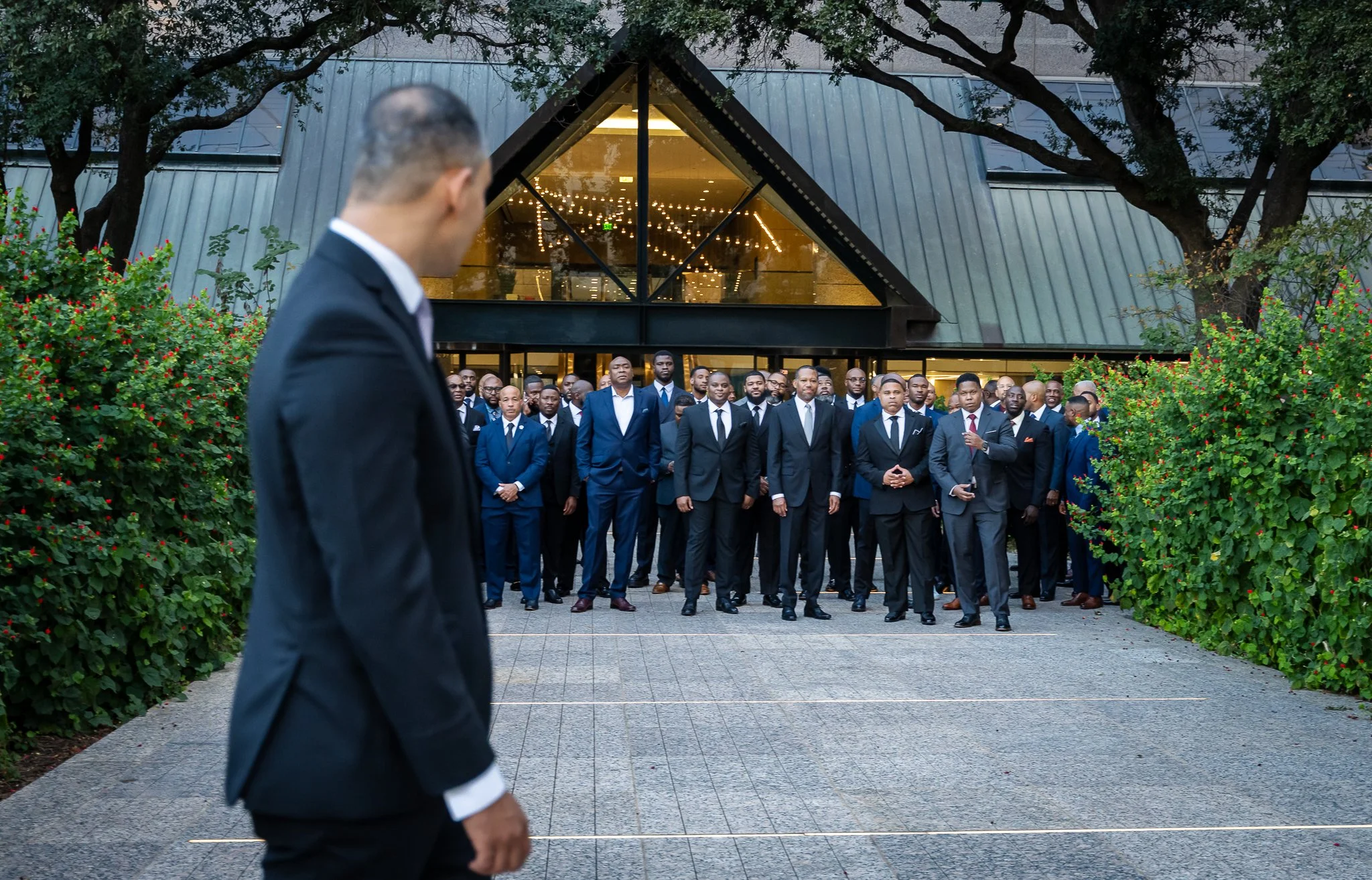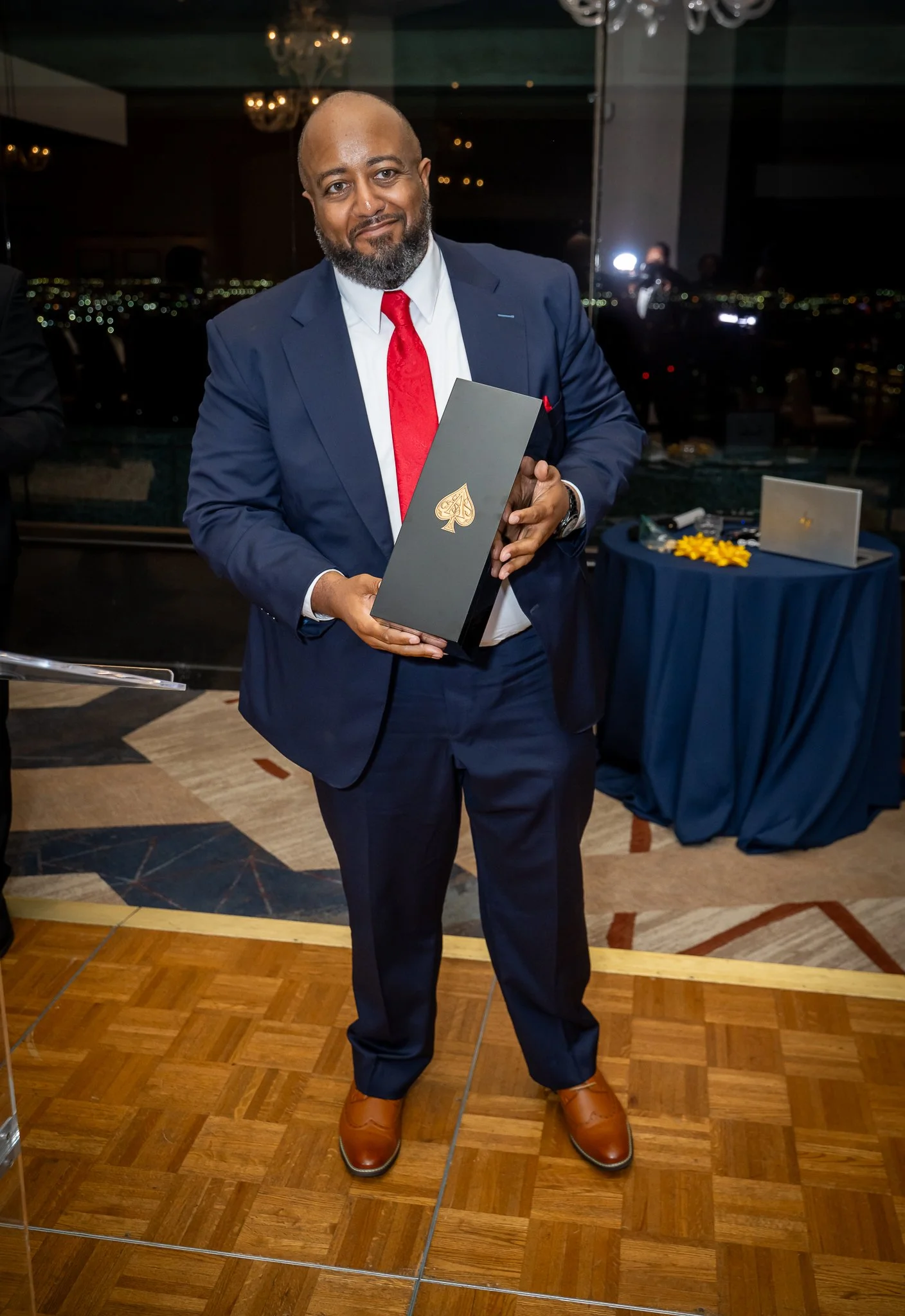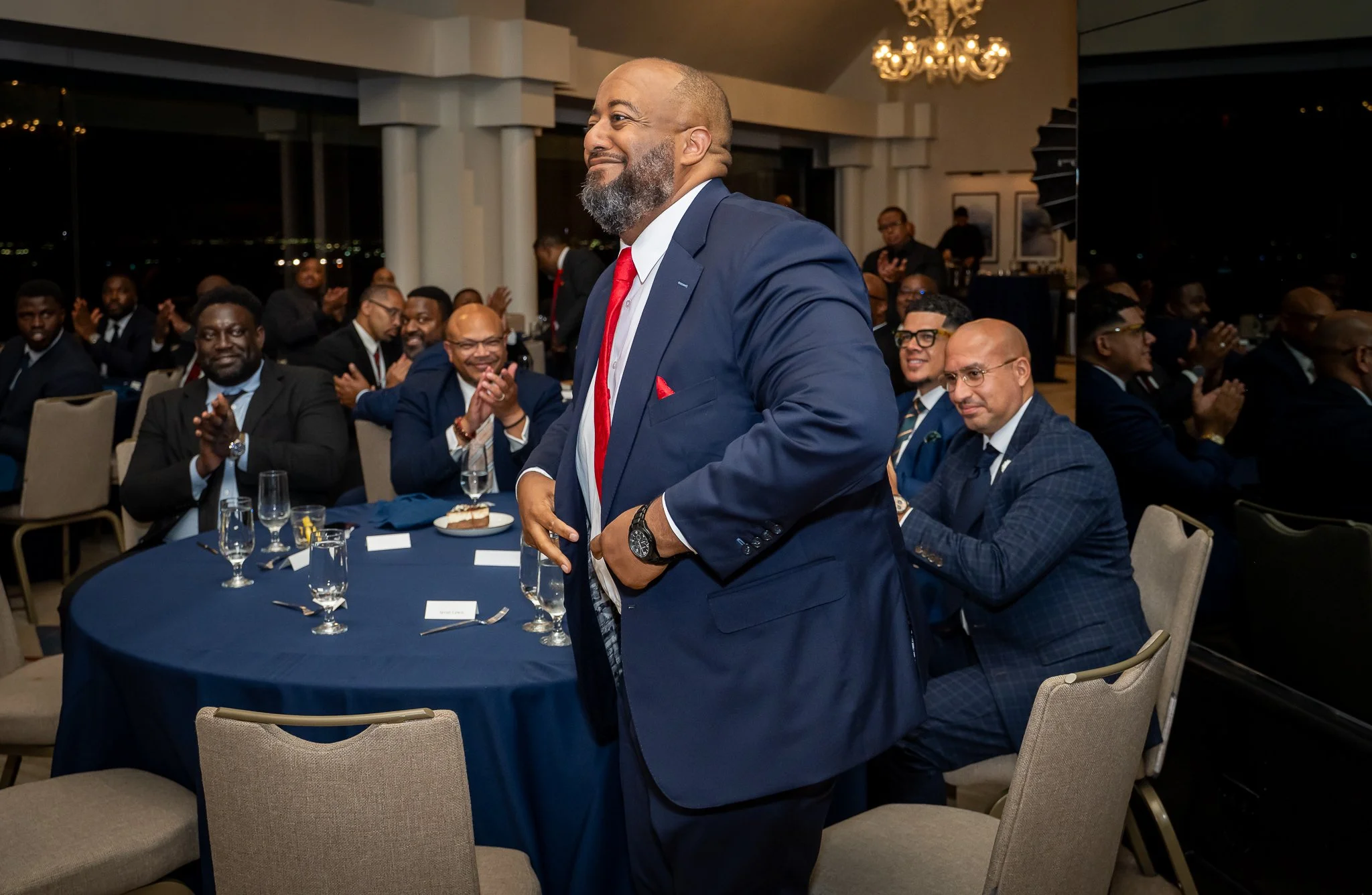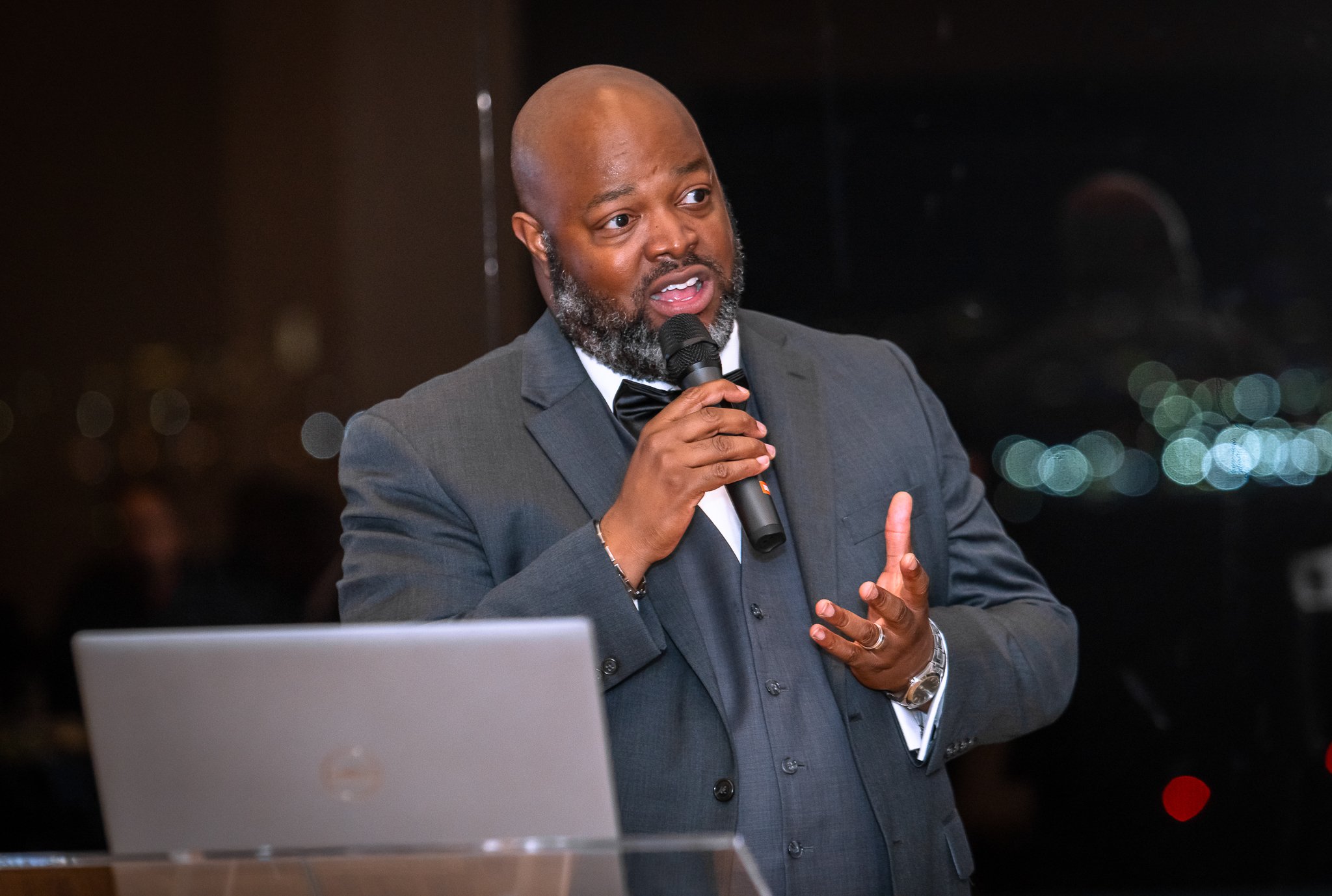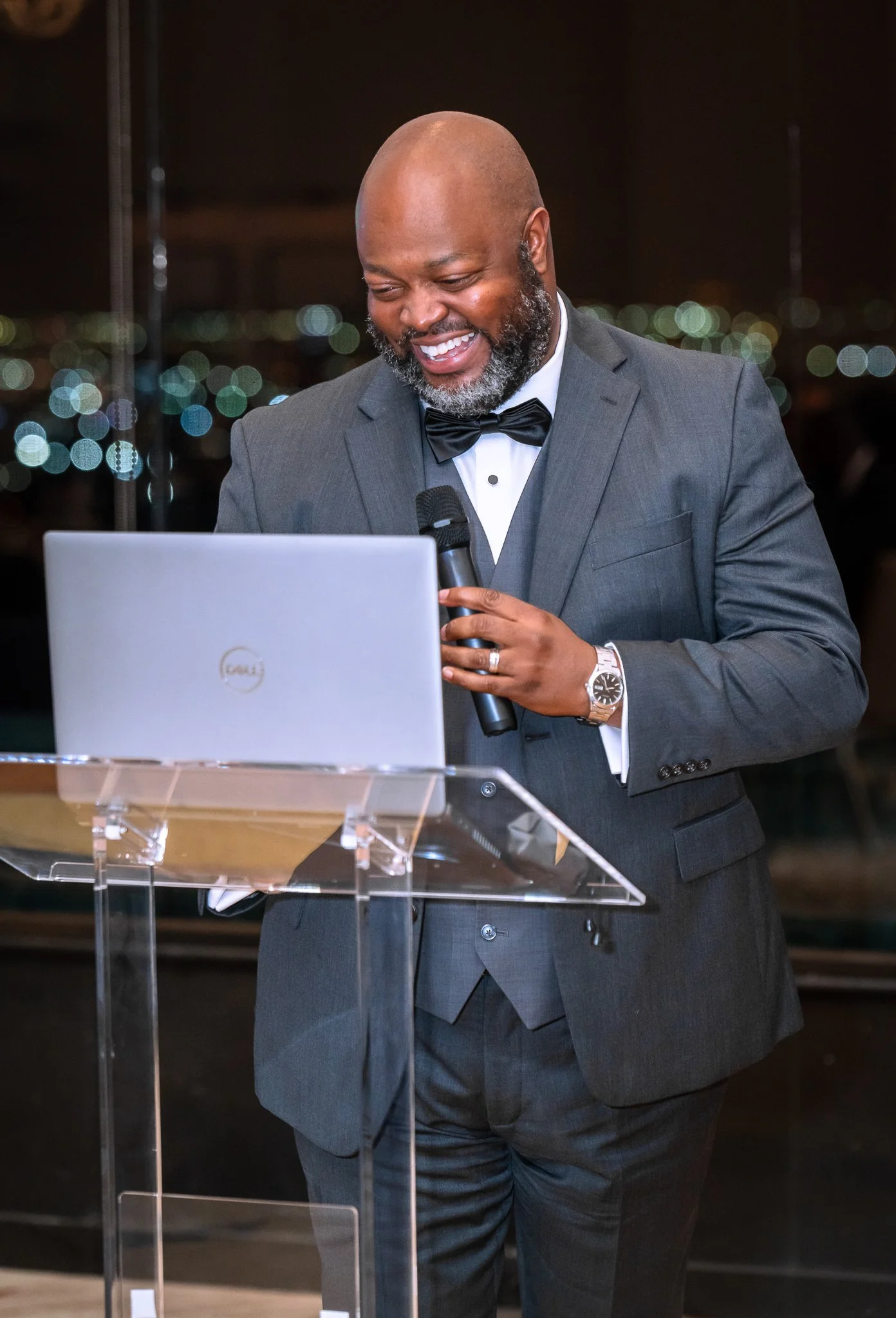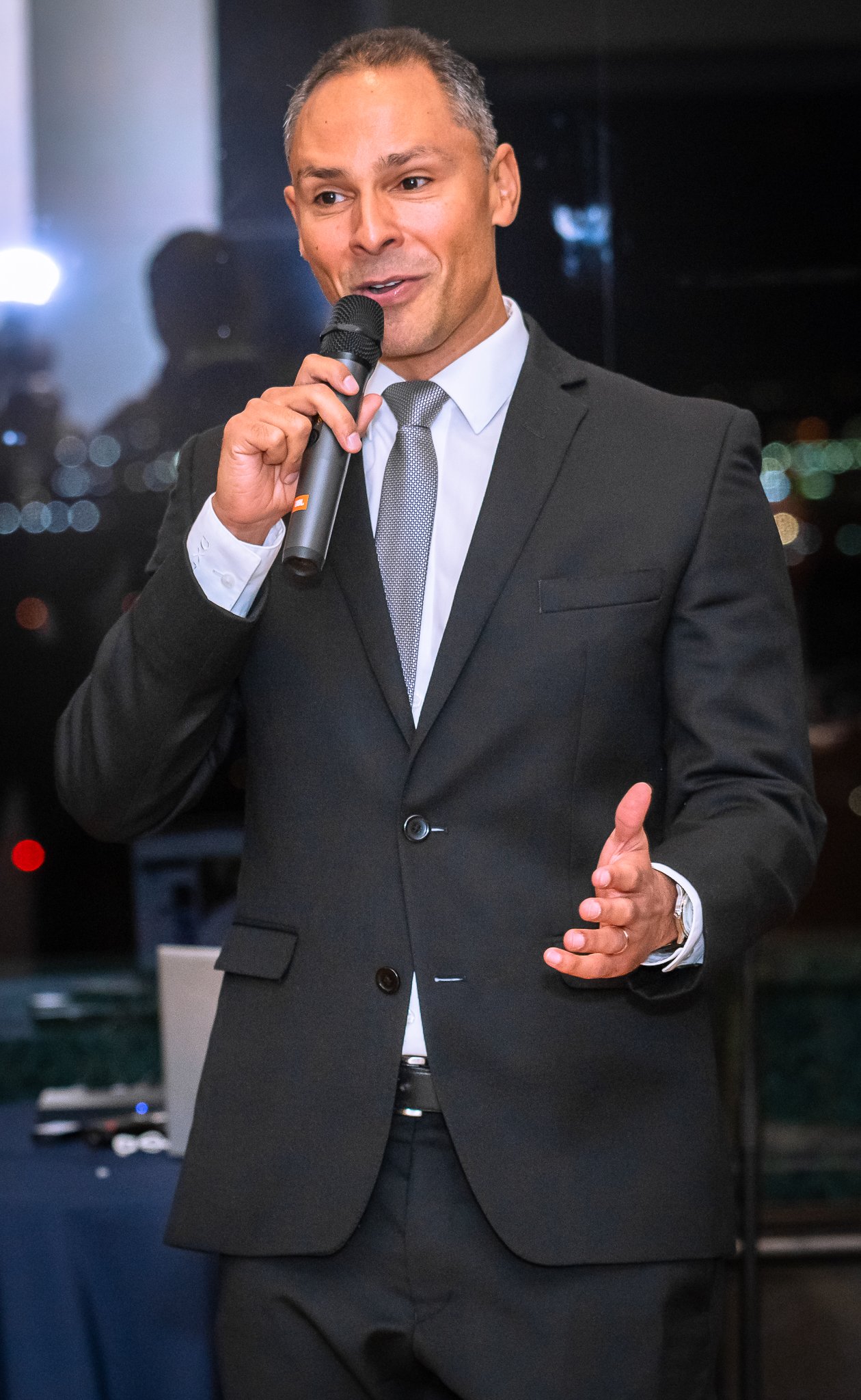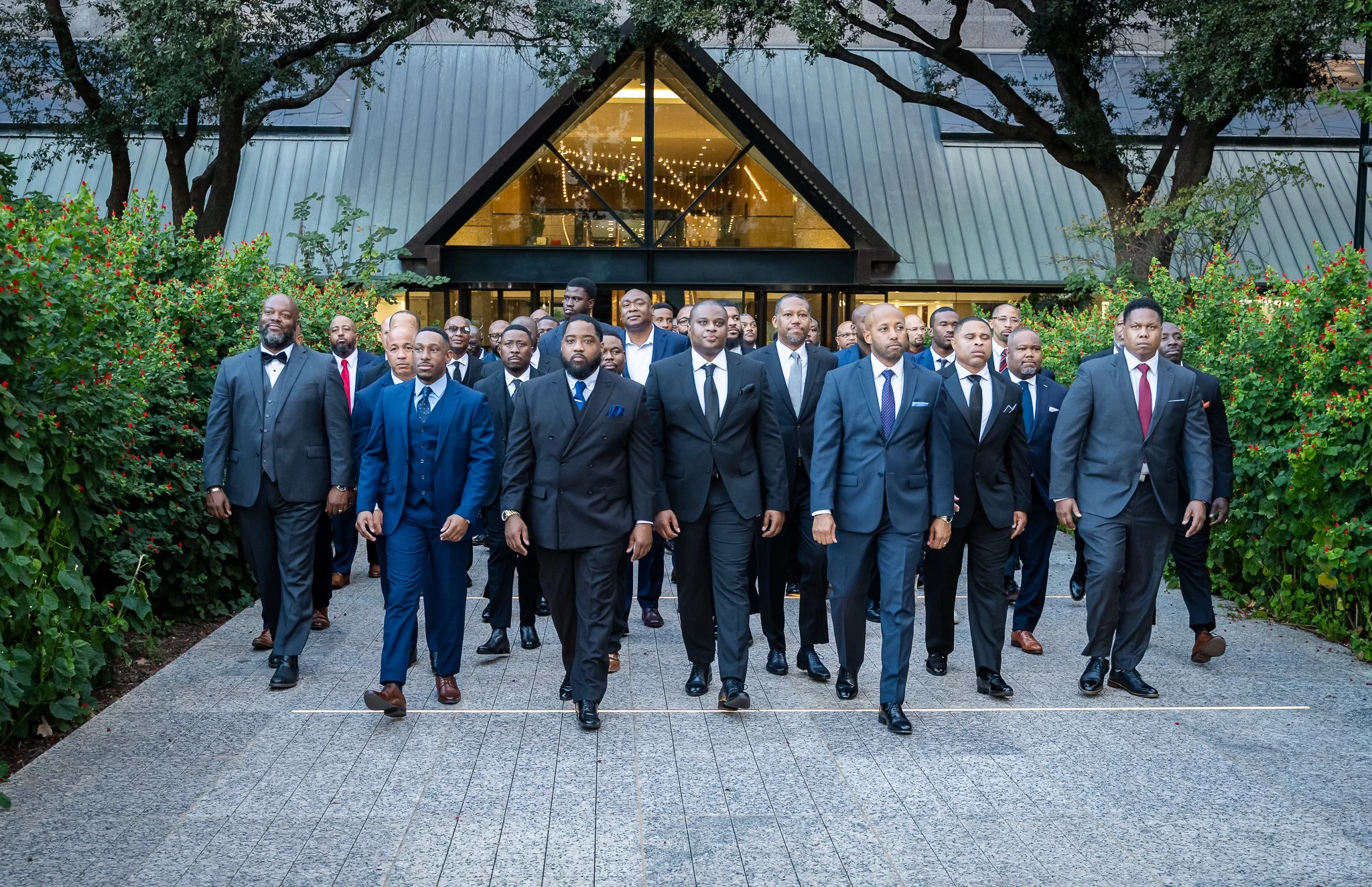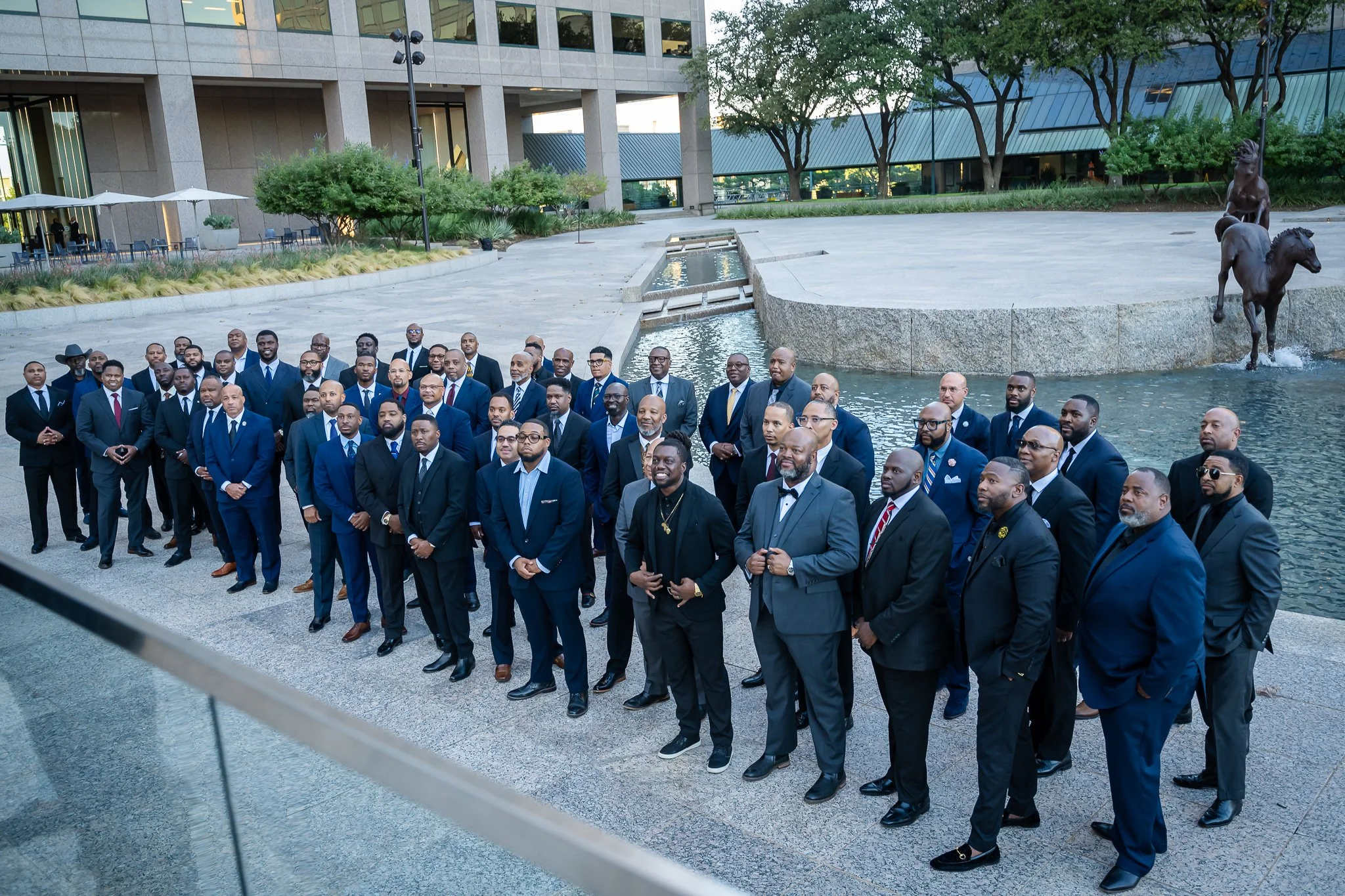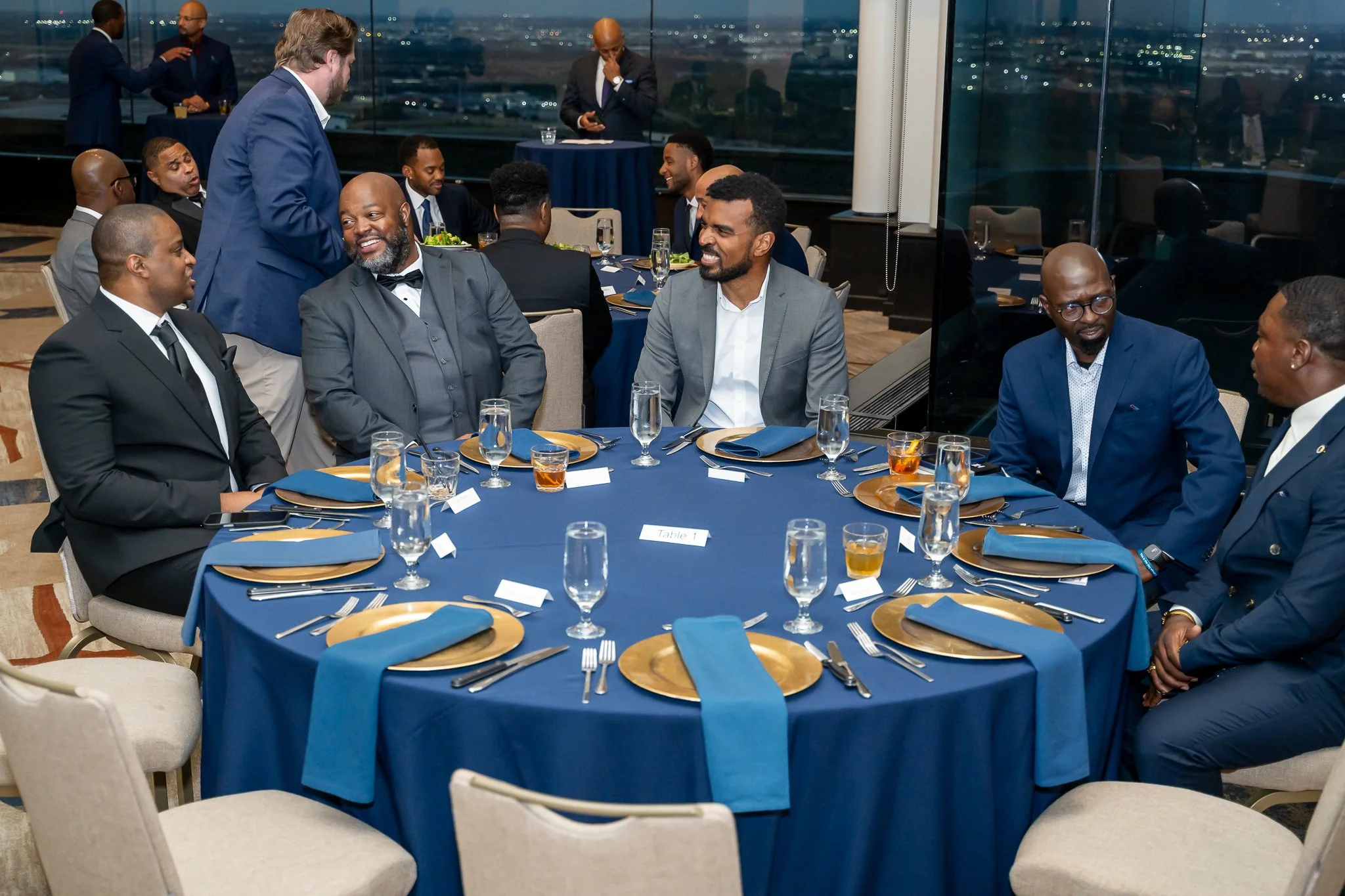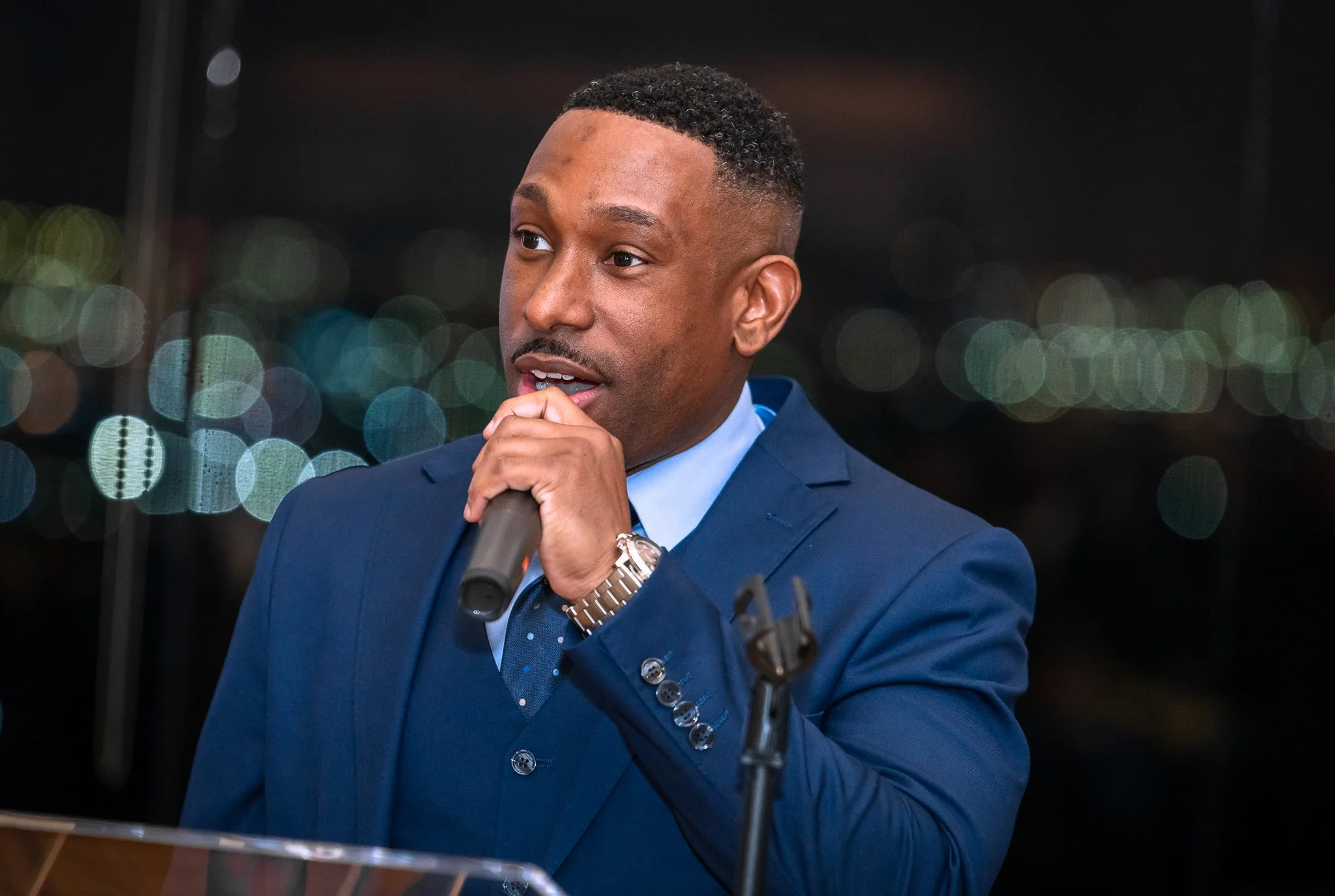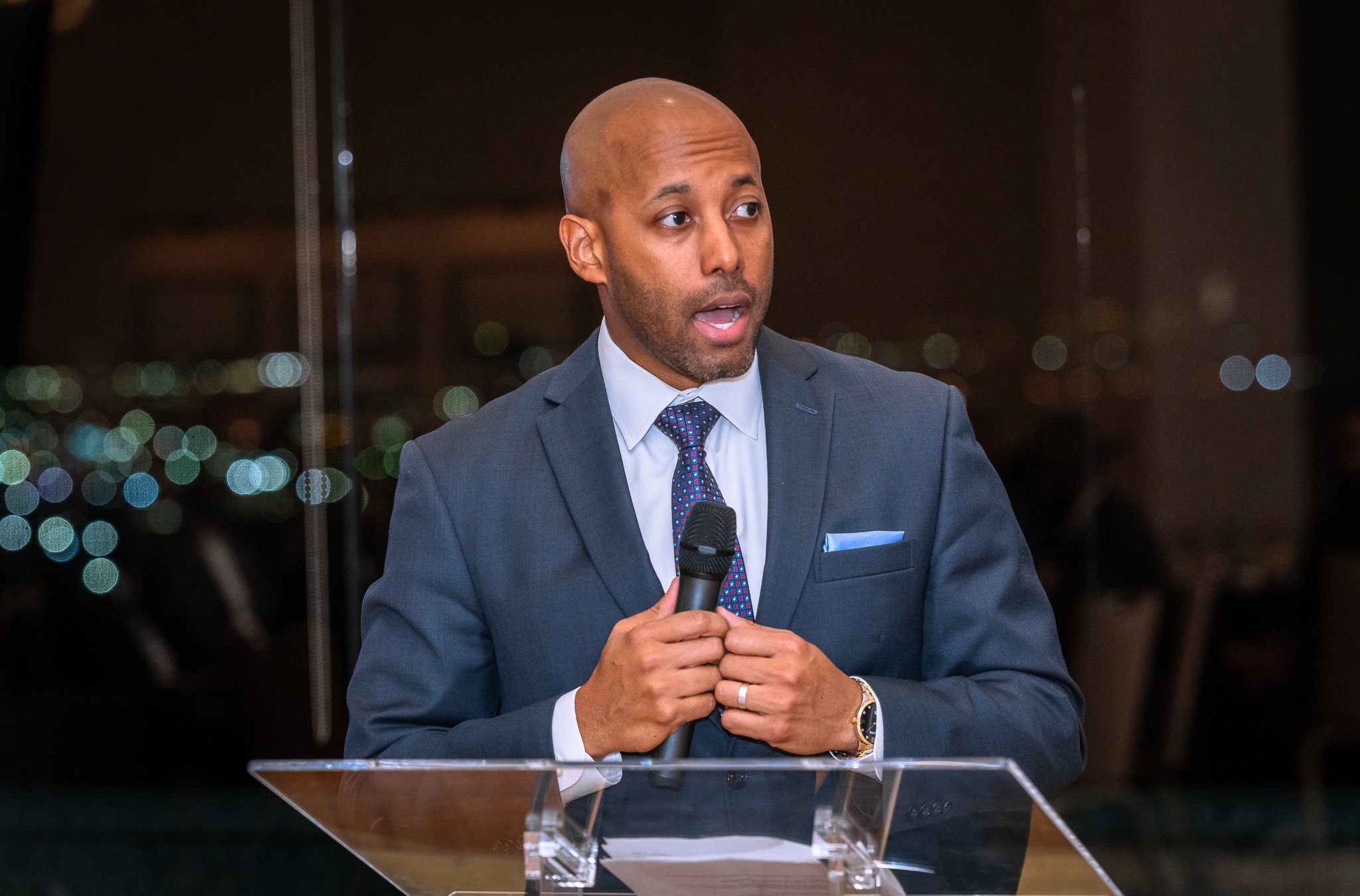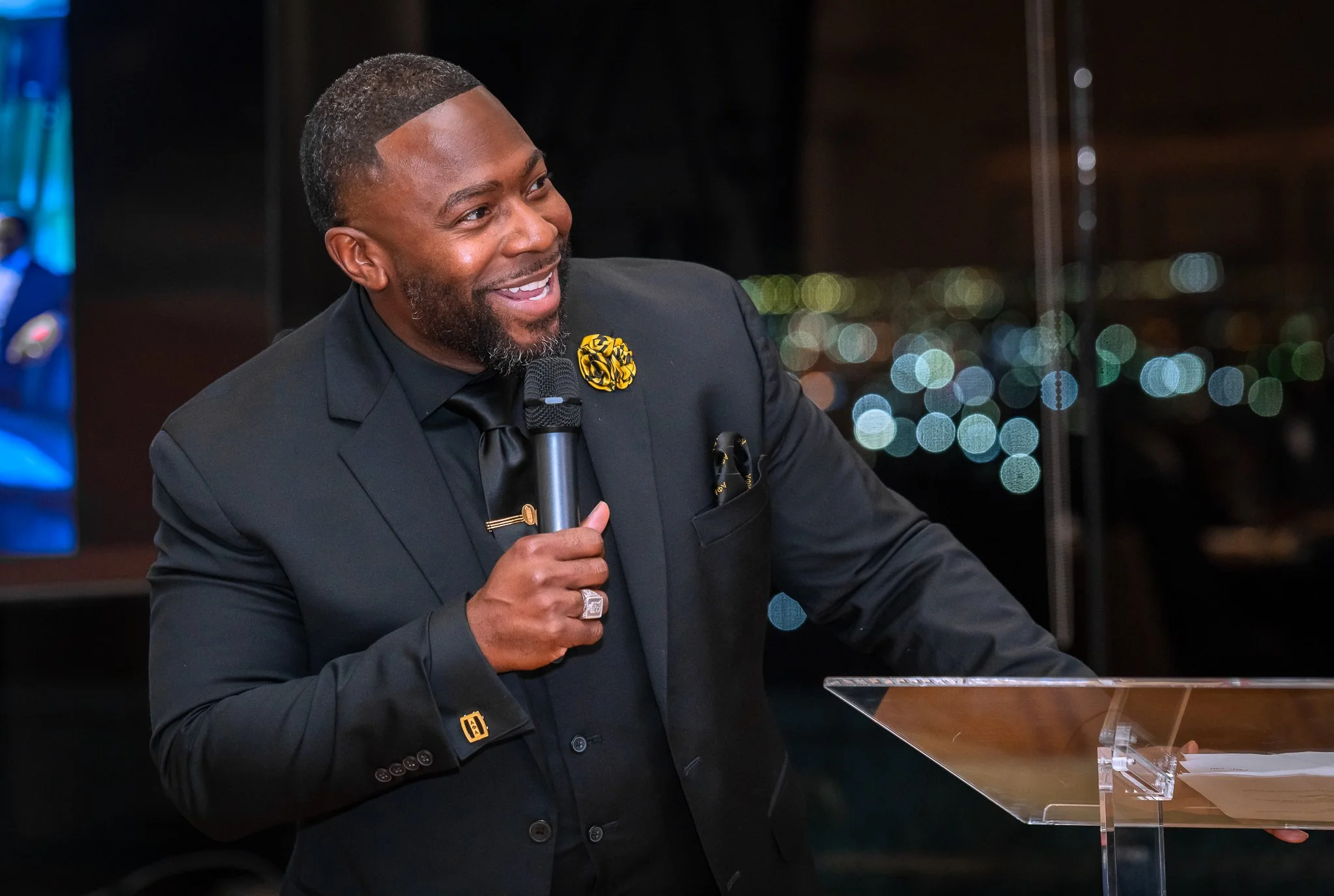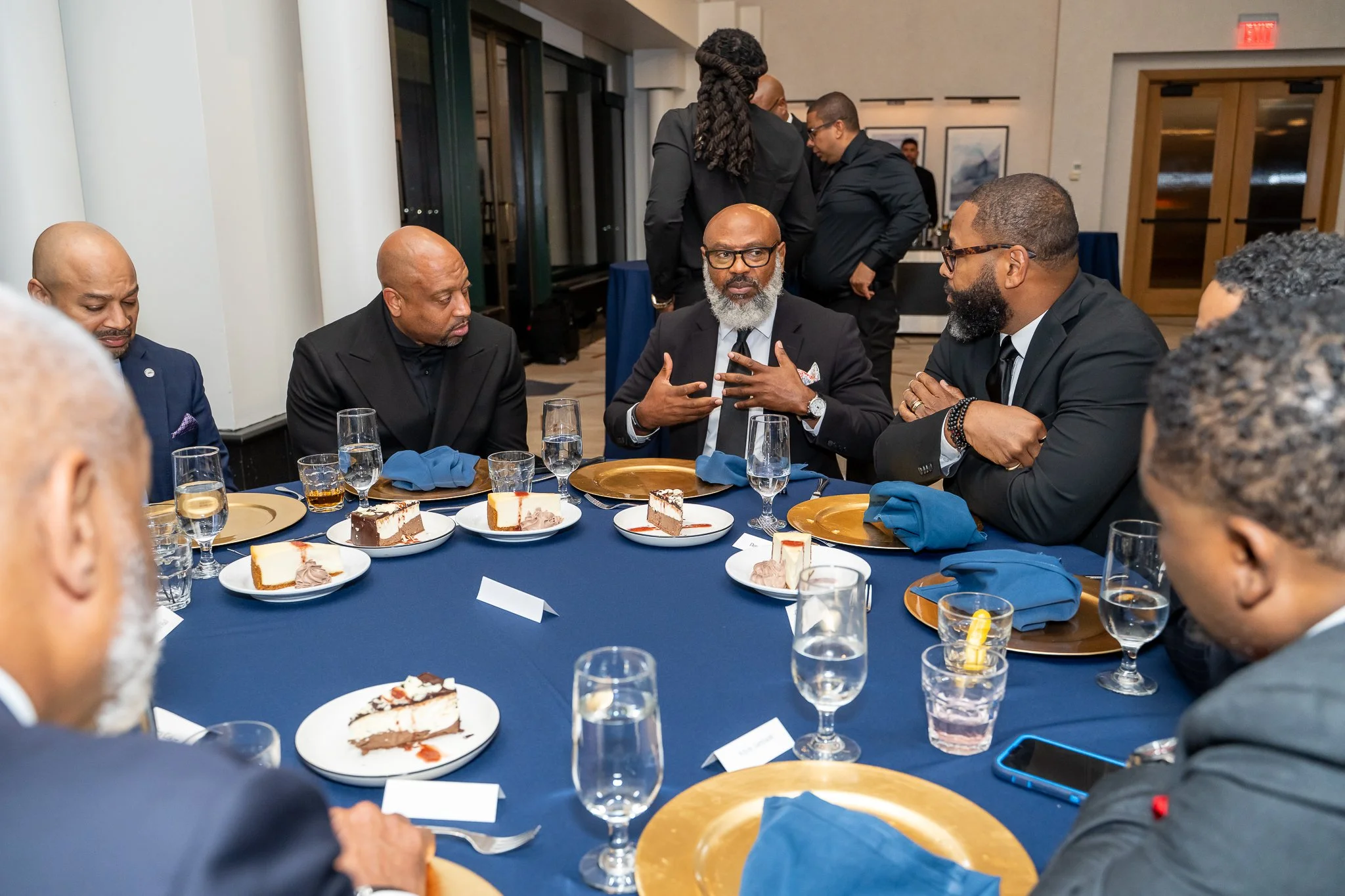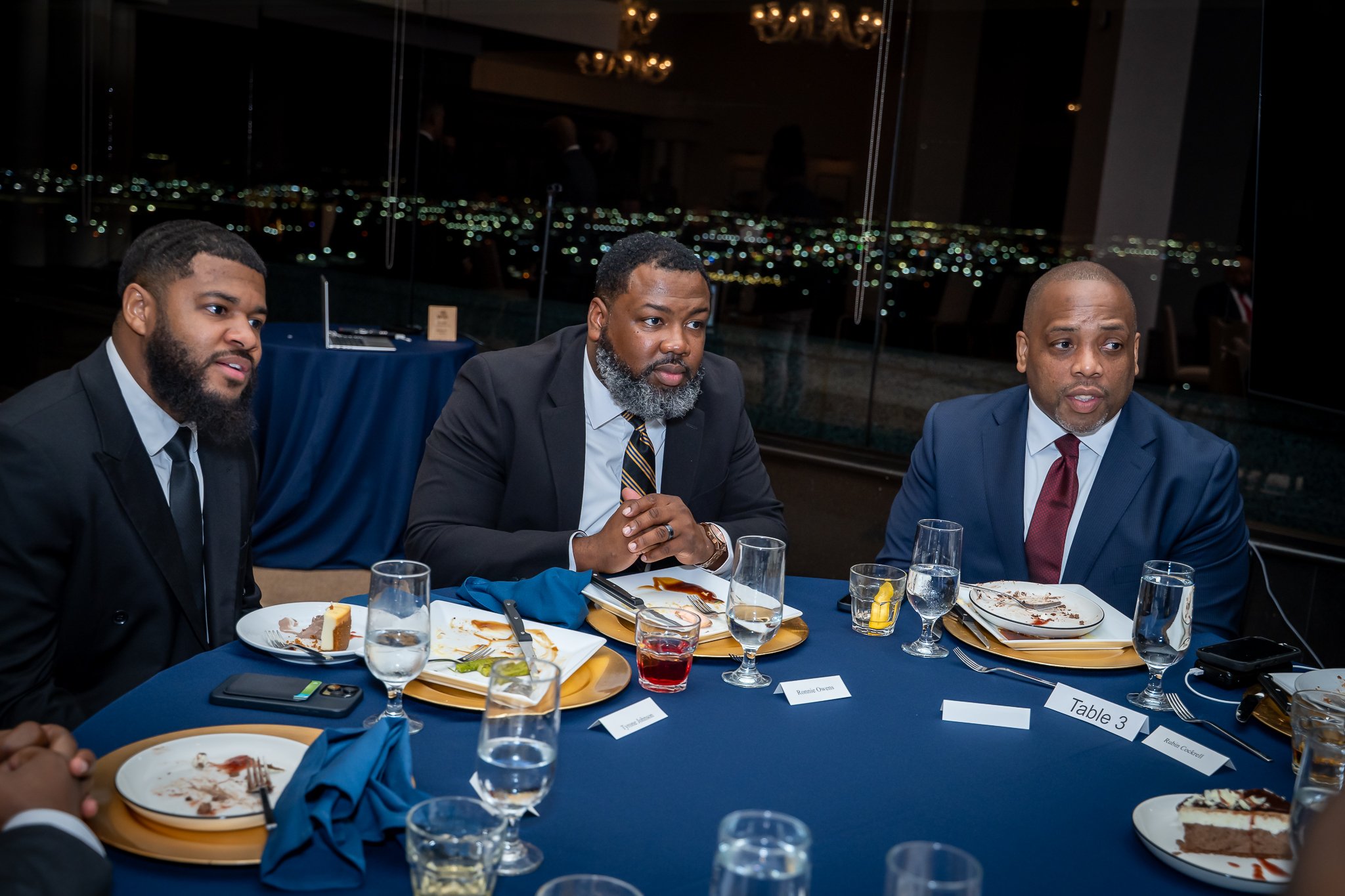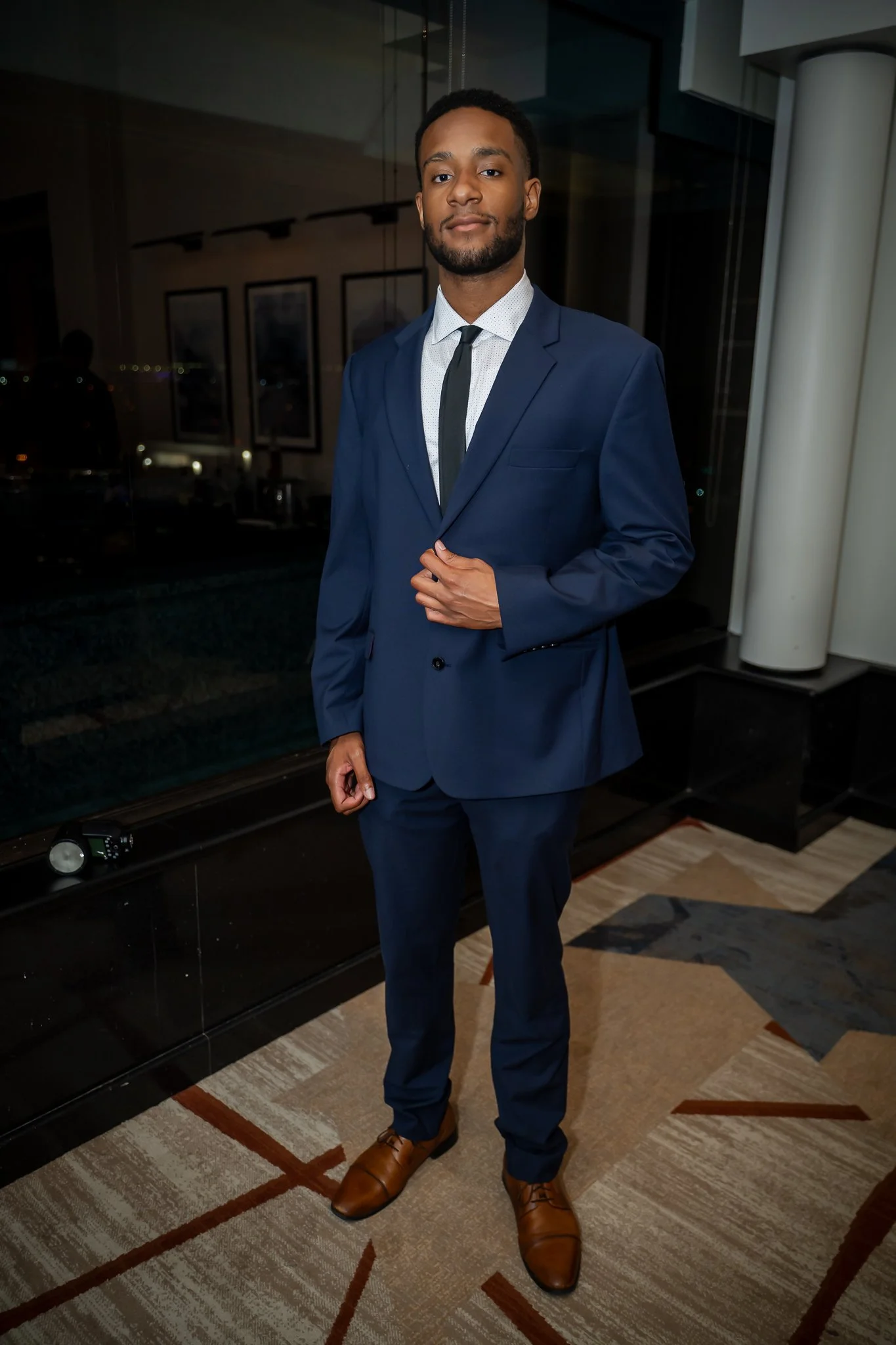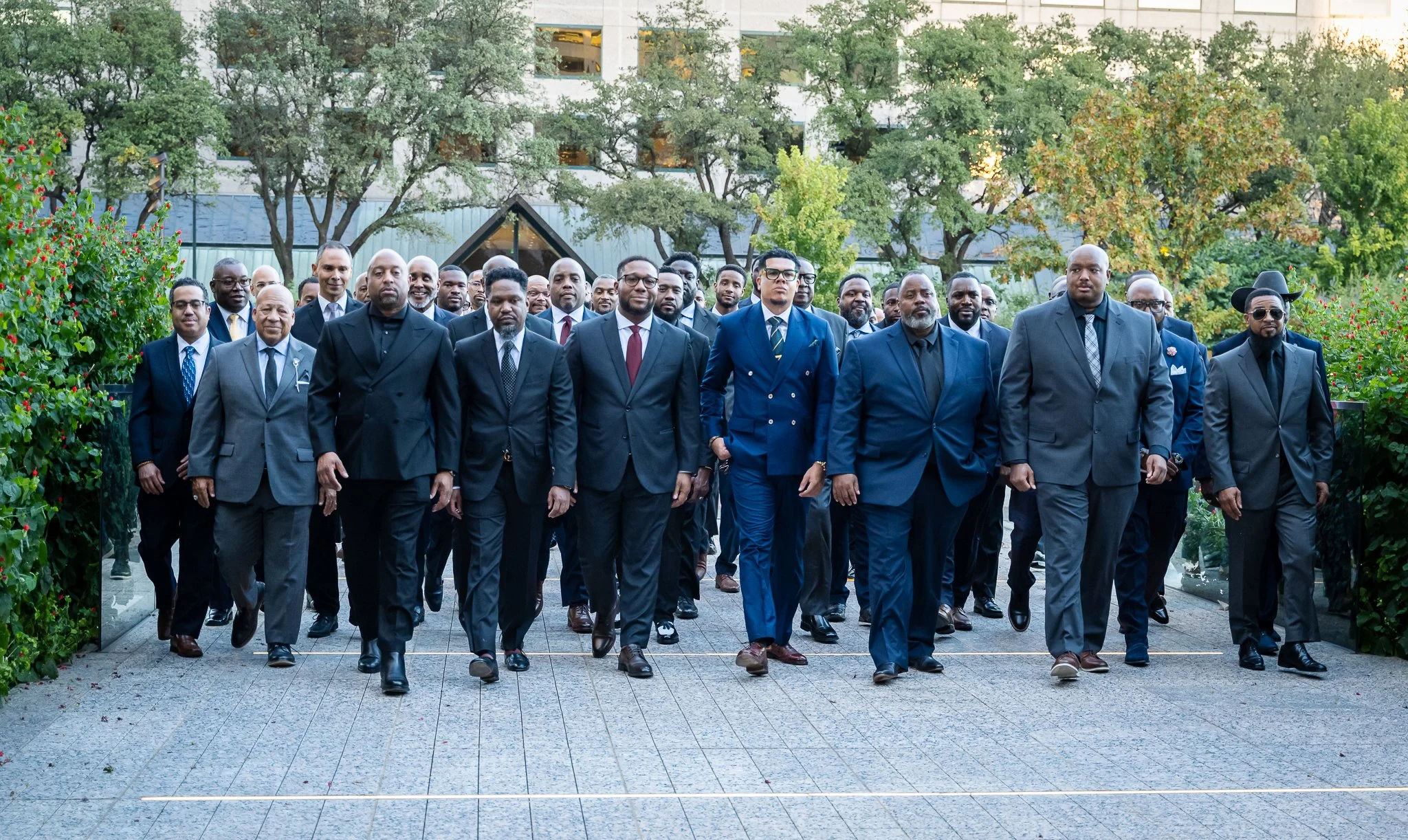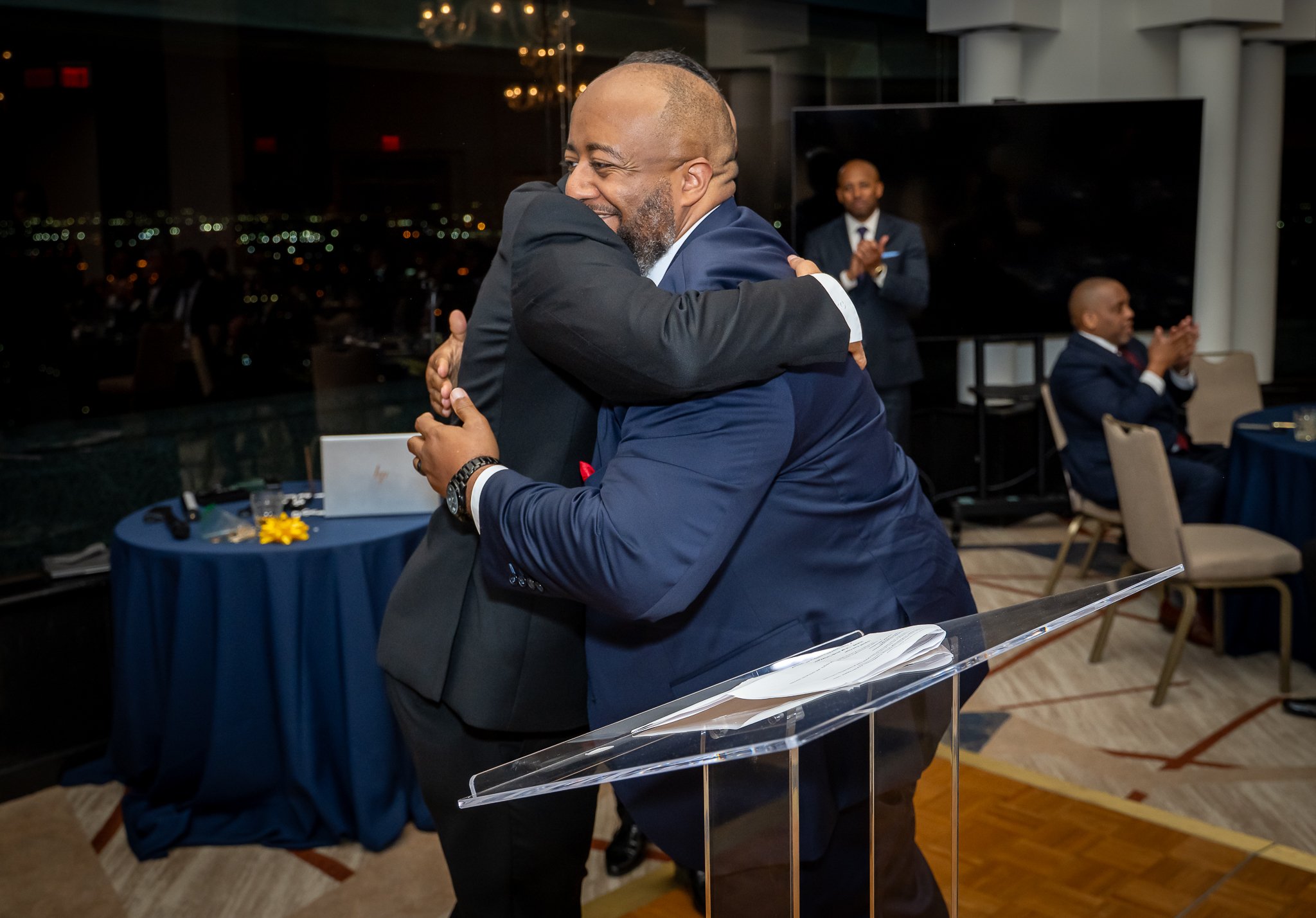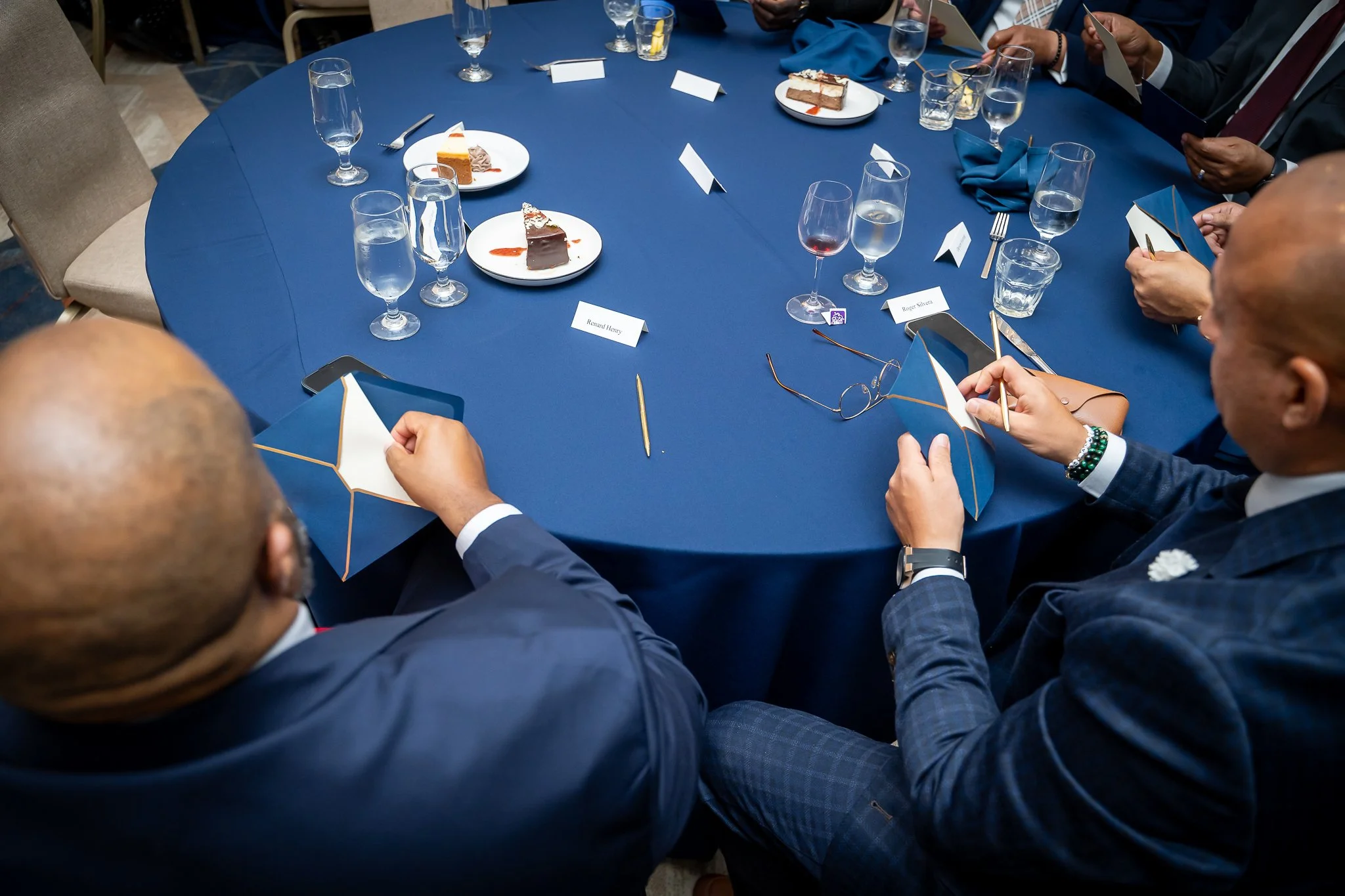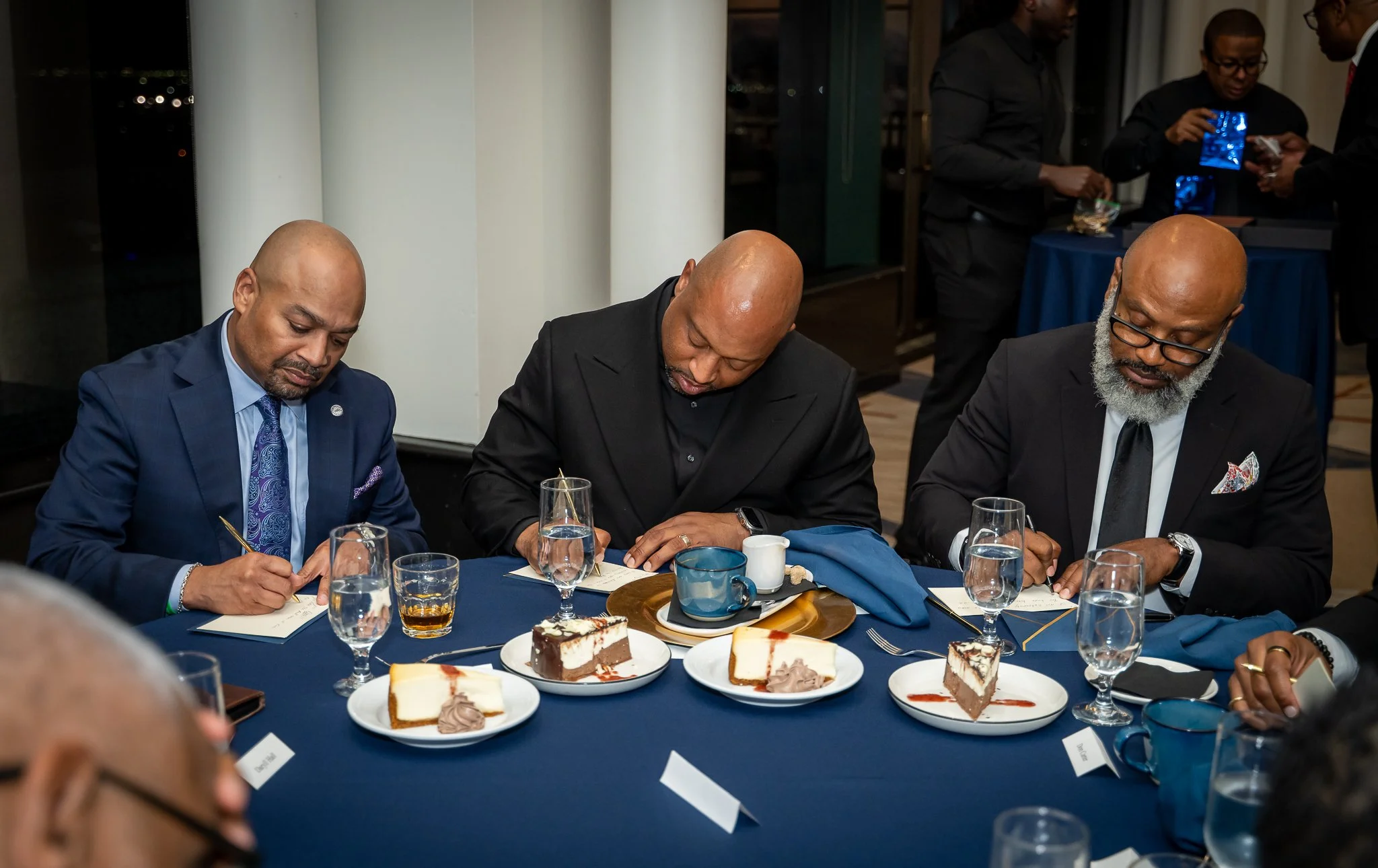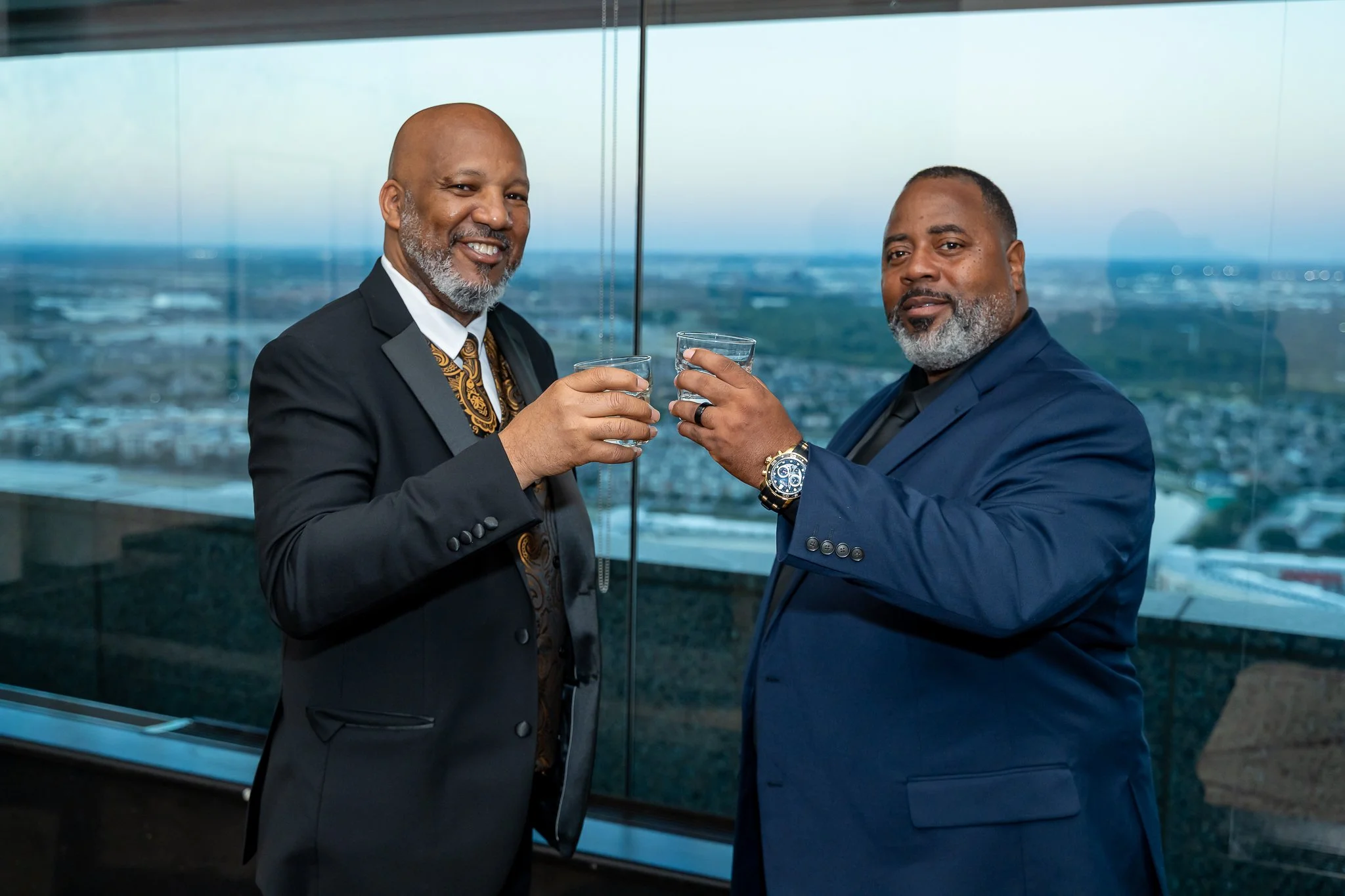Black Executive Men Are Not The Exception, and That's The Point
By Leroy Adams
Jewel Love, founder of Black Executive Men, looks out at the network of men gathered for their Dallas Global Dinner.
Photo credit: sofocus
The narrative says successful Black executives are rare, isolated outliers who somehow made it despite the system. A little over eighty men gathered in Dallas to prove that narrative was always a lie designed to keep them climbing alone.
THE TWO WORLDS
Pictured: Renard Henry, Black Executive Men’s Brother of the Year
Photo credit: sofocus
Renard Henry stood at the floor-to-ceiling windows of the Constellation Club, taking in the evening Dallas skyline. He was smiling from ear to ear, and while I felt a bit of guilt intruding on his moment, I was there to capture every detail of the event—and this was an important one. Renard had just been honored at the Black Executive Men Dallas Global Dinner as the 2025 Brother of the Year, an honor bestowed upon the brother recognized for his performance of excellence in one of Black Executive Men's most demanding career advancement programs, BEM Gold.
In corporate America, the corner office view means you've made it. Floor-to-ceiling windows overlooking city skylines—Dallas, Chicago, New York, Atlanta—are the visual shorthand for success, the backdrop to C-suite achievements and executive power. These views represent elevation, literally and figuratively. You've climbed. You've arrived. You stand above it all, surveying the potential stretching out before you like the glittering lights below.
But for most Black executives, these views are enjoyed alone. Standing at those windows, looking down at the city you're helping to build, you're often the only one in the room who looks like you. The ascension is real, the achievement undeniable, but the isolation? That's the part that doesn't make it into the LinkedIn posts or the company press releases.
Not tonight. Not for Renard.
Photo credit: sofocus
Tonight, he took a moment to celebrate himself, but he wasn't alone in that view. Eighty Black men—C-suite executives, board directors, corporate giants—stood with him on the 26th floor, taking in that same skyline together. What do you see when you're finally not the only one seeing it? You see brothers. You see community. And perhaps most importantly, you see through the lie.
The lie that you have to climb alone. The lie that isolation is the price of excellence. The lie that there aren't others who understand the weight, the exhaustion, the particular burden of being "the only one."
This is not a story about a single man or an exception to some rule. This is a story about the hidden, unspoken norm: successful Black men in corporate America who, at some point in their illustrious careers, sought community and found it through Black Executive Men—a network that lifts the veil, exposing them for the first time to what's on the other side of the lie. Community. Not a network of outliers, but of the norm. Men who have achieved what corporate America told them was the dream, now finally enjoying those skyline views with a new truth: I'm not the only one.
But before we talk about what this different reality looks like, we need to name the world most Black executives already know.
THE WORLD MOST BLACK EXECUTIVES KNOW
Pictured: Samuel Davis
Photo credit: sofocus
"I'm 6'2", 240 pounds. I don't flinch at most people, but I come to tears listening to men who are exhausted—career-wise, personal life, and in their household," said Samuel Davis, the keynote speaker for the Dallas event.
As SVP and Chief Technology Officer of Echelle Resources, Samuel has decades of experience helping organizations implement enterprise-level solutions, leading strategic planning initiatives that drive technological and business transformation.
At 6'2" and 240 pounds, his commanding presence filled the room, yet it was softened by a smile revealing a row of white teeth—the unmistakable expression of a Black man happy to be amongst community. When he stood before this gathering of Black men, delivering a keynote speech that spoke to their collective experience of being "the only one" while reminding them of the power in their stories, that smile said everything: "Our stories are the currency that build legacy."
He spoke of "instructional frameworks designed to make us not try"—systems built not for Black success but for Black exhaustion. His words penetrated the hearts and minds of the brothers in the room as they responded with the slight, gentle cultural nod—the Black man's way of saying "I see you" or "I feel you"—a reminder of the very roots of Black Executive Men.
What started a decade ago as a psychotherapy practice for Black men in corporate America had grown into one of the largest communities connecting hundreds of mid-level, senior, and C-suite executives and board directors across the country and internationally. Jewel Love, the founder of Black Executive Men, stood before the group reflecting on his why, leaning on his decades of experience providing psychotherapy to Black men in corporate America: "I learned how isolated, unseen, and alone Black men are in corporate America, but how educated and talented they are—and that there was an opportunity to be of service."
Let's name what's usually left unsaid: the career exhaustion that can't be admitted in Monday morning meetings. The personal life strains from being perpetually "on," because when you're the only one, every word, every decision, every misstep is amplified. The household pressure to maintain the facade—to never let your family see the weight you carry, to never admit that the corner office sometimes feels like a corner you've been backed into. The loneliness of standing at the summit, achieving everything you were told would make you whole, only to realize the view means nothing when there's no one to share it with who truly understands the climb.
Pictured: Jewel Love
Photo credit: sofocus
What's remarkable—what needs to be said—is that these men have achieved this level of extraordinary success despite all of it. Despite the isolation. Despite the exhaustion they hide behind boardroom confidence. Despite the strain on their personal lives from always being "on," a byproduct of being the only one. Despite the pressure of maintaining a facade so as not to make anyone uncomfortable with their humanity.
They made it to the summit carrying weight no one acknowledges. But what if there was a room where you didn't have to carry it alone?
ENTERING THE DIFFERENT WORLD
Pictured: Black Executive Men
Photo credit: sofocus
One could mistake what they were looking at for a GQ photoshoot titled "The Ascent: Black Excellence in Motion." At golden hour, the men gathered in front of the iconic sculpture The Mustangs of Las Colinas. Visitors to the city of Irving often describe the bronze horses as "breathtaking" and "larger than life"—nine muscular mustangs captured mid-gallop through a granite stream, their powerful forms frozen in eternal motion. The placement was intentional. The visuals, deliberate. Jewel Love has never been shy about that.
"Before we head to the top, we have to capture the moment," he told the men while directing their positions, the videographer and photographer circling the group. "We have our production team here. They're going to capture this story. It's all about visibility."
The invitation to be the focus—despite their success, despite their titles, despite the billions in assets under their collective management—was new to some. In corporate America, Black executives are often hyper-visible and invisible simultaneously: scrutinized for every move while their contributions go uncelebrated. Here, visibility meant something different. It meant being seen not as the exception, but as the standard. Not as one, but as many.
Photo credit: sofocus
After the photoshoot, the men ascended to the 26th floor.
What awaited them at the Constellation Club wasn't a conference room with plastic water bottles and generic catering. This was a world built with intentionality. At each seat: a golden pen, its weight substantial in hand, reminding whoever held it that what they would write tonight mattered. Black Executive Men envelopes with wax seals sat beside elegant place cards bearing each man's name. The floor-to-ceiling windows framed the Dallas skyline as if the city itself were part of the table setting. Crystal glassware and gold plate settings caught the evening light. Royal blue linens stretched across tables arranged to encourage conversation, not isolation.
Photo credit: sofocus
Corporate America rarely honors Black men with this level of care. Black Executive Men do it as standard.
This is the world Jewel built on three foundational pillars, what he calls the Culture, Excellence, Results framework:
Culture: Friendship first, relationships first. Before the deals, before the board seats, before the business opportunities—brotherhood. "If we don't have authentic relationships with each other, none of the rest matters," Jewel explained to the room. "This isn't transactional networking. This is family."
Excellence: We demand it of ourselves and each other. The room held men managing billions in assets, leading Fortune 500 departments, sitting on corporate boards, building international businesses. Excellence isn't aspirational here—it's the entry point. "We're not here to lower standards," Jewel continued. "We're here to raise each other to the standards we already hold."
Results: Career progression, C-suite, business opportunities—people are watching. Jewel asked the room a question: "Who here will be in the C-suite in the next two years?" Dozens of hands rose without hesitation. "Who here will serve on for-profit boards?" More hands. This wasn't hope. This was inevitable. "The world is watching what we build," Jewel said. "And we're building it together."
In this world—filled with curated photoshoots, gold place settings, bottles of Ace of Spades chilling at the bar, tailored Tom Ford suits, wrists adorned with timepieces rivaling down payments, fine foods and wines paired with intention—the men laid down the weight of performance in exchange for the freedom of presence. They exchanged the exhaustion of being "the only one" for the restoration of being one of many.
THE POWER OF THREE MINUTES
Pictured: Jamaar Rashad, Black Executive Men Dallas Regional Leader
Photo credit: sofocus
The evening presented a carefully curated lineup of voices, each speaking to a different dimension of what Black Executive Men represents. Samuel Davis, the keynote speaker, brought decades of corporate technology leadership and a willingness to name the exhaustion so many carry in silence. Jamaar Rashad served as host, his energy keeping the room engaged and connected throughout the evening. Sean Howard, the San Antonio Regional Leader, spoke about the connective power of Black Executive Men—how relationships formed in these spaces transcend geography and create opportunities that isolated networks never could.
It was Sean who introduced the evening's final speaker with a story that exemplified everything BEM stands for. He recounted how he met Jeff May, Chief Administration Officer of the San Antonio African American Community Archive and Museum—the third-largest African American museum in the country—through the network. Not at a formal event. Not through a LinkedIn message. But through the kind of authentic connection that happens when Black men build with intention. "This is what we do," Sean said, gesturing between himself and Jeff. "We find each other. We support each other. We build together."
Pictured: Sean Howard, Black Executive Men San Antonio Regional Leader
Photo credit: sofocus
When Jeff May rose to address the gathering, his words carried the weight of history—both the history preserved in the museum he leads and the history being made in that very room. He spoke of heritage under threat, of Black institutions fighting for survival in a political climate increasingly hostile to our stories. He reminded the men that their success, their presence in corporate America, their collective power wasn't just about personal achievement—it was about answering a call.
"We are the response to the cultural erasure we're witnessing," Jeff said, his voice steady with conviction. "We must answer the call to meet the moment and preserve our legacy."
His words landed with particular resonance. These men, who had climbed to heights their ancestors could only dream of, were being reminded that the summit means nothing if the story of the climb is erased. That corporate success rings hollow if the culture that produced them is allowed to disappear. That being "the only one" in a boardroom is lonely enough—but imagine a future where there's no record that we were ever there at all.
Pictured: Jeff May, Chief Administration Officer of the San Antonio African American Community Archive and Museum
Photo credit: sofocus
The power wasn't in escaping the weight of isolation for one night. The power was in dismantling it so no one would carry it again.
After Jeff's call to preserve their collective legacy, Jewel asked the room to do something most executives rarely experience: pause.
"I want you to turn to your table," he instructed. "Each man gets three minutes. Three minutes to have a real conversation. Not about what you do. About who you are."
The setup line hung in the air: He may have never had three minutes in his life.
Three minutes where no one is performing. Three minutes where "How are you?" means "How are you, really?" Three minutes where the armor can come off.
Photo credit: sofocus
Around the tables, conversations erupted—not the polite exchanges of business cards and elevator pitches, but the honest sharing of lived experience. Career advancement strategies, yes. Entrepreneurship challenges and investment opportunities, absolutely. Real estate moves, mentorship needs, board positioning strategies, legacy planning—all of it was on the table.
Photo credit: sofocus
But also: family struggles that don't make it into the annual review. Health concerns that get buried beneath quarterly reports. Hobbies abandoned because there's no time when you're always "on." The full humanity that corporate America doesn't see—or doesn't want to see—finally had space to breathe.
WHEN DID I BECOME THE ADULT?
A younger voice emerged—not yet seasoned by the decades of life and career that marked most men in the room. The gentleness of his speech, preceded by the slight stutter of nervousness that comes when you're finally seated at the big table, belonged to Troy Jackson. The soft-spoken twenty-year-old Asset and Wealth Management Analyst with Goldman Sachs shared his story of navigating friendship, loss, and the weight of being first:
"I lost a close friend at the age of 17, and he was someone who shared similar ambitions and drive as me. That loss left me feeling alone despite having other friends and, of course, family. But no one else matched that pioneer energy that we shared. As the oldest sibling taking the route that I'm taking, I can't turn to anyone else for career support. It was a big mental shift to realize that the adults who raised me were now looking up to me for guidance and direction."
Pictured: Troy Jackson
Photo credit: sofocus
Around the table, the elder men gave space for this young man to share, smiling and nodding as he spoke, affirming the importance of the moment. He continued, "It's been encouraging to hear all of you speak and learn that growth is a process. I'm happy I'm in this space, and I think it's a testament to me trying to seek out people who are at different levels of success who are willing to just sit and listen. I've probably never shared something like this before, so I appreciate you all for listening."
The room wasn't quiet because men had nothing to say. It was focused because they finally had space to say what matters.
If Troy's story represented the importance of reaching young leaders early—guiding them before the isolation sets in, before they navigate career pitfalls alone, before they lose the "pioneer energy" that connects them to others—then Renard Henry, the Brother of the Year, was living proof that it's never too late.
EXECUTIVE SWAGGER
Pictured: Black Executive Men
Photo credit: sofocus
Renard had already spent years in corporate America. He'd already climbed. He'd already achieved what many would call success. But before Black Executive Men Gold, he was climbing alone, believing—like so many do—that hard work alone would be enough. Black Executive Men found him mid-ascent and showed him what he didn't even know he was missing: executive swagger, strategic thinking, a business mindset instead of a department mindset, and most importantly, the freedom from the myth—and pressure—of being the only one.
This award doesn't only recognize the biggest fund raised or the most impressive title. It celebrates character over credentials. Consistency in showing up for others. Extending the ladder even when it costs something. Ubuntu in action: I am because we are.
Back at those floor-to-ceiling windows overlooking Dallas, I approached Renard and asked him how he was feeling.
"I want other brothers to experience Black Executive Men," he said, his smile still radiant. "We don't get to be in a room full of Black executives like this. If anyone asks what Black Executive Men are, I'd be happy to speak about it because we need more of us at the executive level. But more importantly, we need to know we're not the only ones."
He was briefly interrupted by men approaching to congratulate him—"Congrats, brother, you deserve this"—the kind of genuine celebration that happens when success is shared, not hoarded.
Pictured: Renard accepts the Brother of The Year Honors
Photo credit: sofocus
Renard continued, his voice carrying the conviction of someone who had experienced transformation: "Before Black Executive Men, I held the belief that if I work hard, I'll advance in my career. Black Executive Men helped me learn that more was needed. Black Executive Men taught me the nuances of ascending the corporate ladder. I feel different. I learned how to have that executive swagger when I'm walking into a room. I feel seen."
I asked him what specifically about Black Executive Men Gold—one of the network's most demanding career advancement programs—gave him that swagger and confidence.
"Black Executive Men Gold made me more focused and strategic. They held us accountable. They taught me how to switch my mindset from a department mindset to a business mindset—how do I grow the business and not just my Finance Department?" He paused, looking out at the Dallas skyline. "Everyone in my department took notice. They started referring to me as an executive and not a department lead. Black Executive Men Gold gave me the skills and confidence, while the network keeps me emboldened because I know I'm part of a vast network of brothers doing the same."
BLUE LETTER TRADITION
Photo credit: sofocus
The golden pens at each place setting weren't decorative. They were tools of legacy.
As Renard's words settled over the room, Jewel introduced the final ritual of the evening: the Blue Letter Tradition—a letter of friendship from one Black man to another. Developed by Black Executive Men Founder & CEO Jewel Love, the Blue Letter has become a timeless tradition of friendship between Black men, centered in Dallas and expanding across the network's global reach. Each man received a Black Executive Men envelope, sealed with wax, formal and reverent. Inside, elegant stationery waited—blank space ready to be filled with words of encouragement, wisdom, and affirmation for a Black man in their life.
What started a decade ago as a psychology practice in Oakland for corporate Black men has now grown into a global private corporate network of over 600 men around the world. The Blue Letter embodies the evolution of that vision—transforming what Jewel learned in those early therapy sessions about isolation into a ritual that makes brotherhood mandatory.
"I want you to write a letter," Jewel instructed the room, his voice carrying weight and intention. "Not to yourself, but to another Black man in your life. To the executive, the father, the brother you're building with. Real words. True words. Words that will remind him why he's not alone and why he's needed."
The assignment landed heavy. Around the room, executives who negotiate billion-dollar deals found themselves pausing, pens hovering over paper. How do you distill years of unspoken gratitude into sentences? How do you tell another Black man he matters in a world that constantly suggests otherwise?
Photo credit: sofocus
The room fell into a sacred silence. Not the uncomfortable quiet of people with nothing to say, but the reverent stillness of men finally given permission to be honest—perhaps emotional—through the pen, writing words a brother would read and find his swagger in each line.
Letters began to flow. Some men wrote to mentees navigating early career challenges like Troy. Others wrote to peers carrying weight they rarely acknowledge. Some wrote to fathers who never had this kind of community. Others penned words to sons inheriting a different path. The themes emerged organically: "I see you working twice as hard..." "The weight you carry isn't yours alone..." "Your presence makes it possible for the rest of us..." "Thank you for existing in spaces that weren't built for us..."
Photo credit: sofocus
These weren't LinkedIn recommendations or performance reviews. These were covenants. Brother to brother. Executive to executive. Man to man.
Corporate America never gives Black men permission to tell each other they matter. Black Executive Men makes it mandatory.
As the men sealed their letters, the power of the moment was undeniable. Eighty men. Eighty letters of declarations and brotherhood written in real time, with golden pens, against the backdrop of the Dallas evening skyline, witnessed by brothers who understood the climb because they were climbing it too.
The view from the summit had changed forever.
Photo credit: sofocus
What do you see from the 26th floor when you're not alone?
You see yourself—past, present, and future—reflected in the faces of men who refuse to let you climb alone. You see a letter in your hand, sealed with a promise to another brother. You see a room that will still be here when corporate America tries to convince you that you're the only one again.
You see proof that the second world—the one where Black executives build legacy while staying human—isn't just possible.
It's here. And it's been waiting for anyone brave enough to walk through the door.

